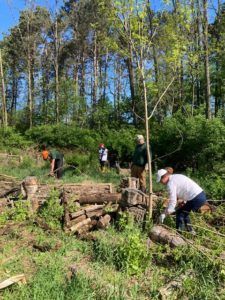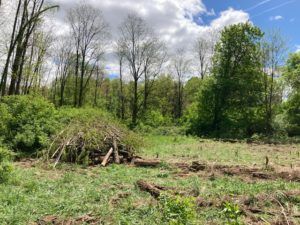On the Ground Junior: Students Remove Invasive Vegetation From Rose Lake State Game Area

Volunteers cut invasive black locust trees and use limbs and logs to create brush piles that enhance wildlife habitat at Rose Lake SGA.
On Tuesday, May 17, 2022, 19 volunteers including 16 high school students who are part of the Animal Science and Zoo Management program at Potter Park Zoo in partnership with Eaton Regional Education Service Agency Career Preparation Center joined On the Ground Junior (OTG Jr) and the Michigan Department of Natural Resources (MDNR) at Rose Lake State Game Area (SGA). These hard-working volunteers cleared invasive black locust trees from a wildlife opening and constructed brush piles to benefit small mammals and other wildlife using the cut woody vegetation. In total, just under 1 acre of wildlife habitat was directly impacted by the volunteers.
On Tuesday morning, students gathered at the north end of the SGA where the MDNR has been managing a wildlife opening since 2015. This opening amidst the surrounding deciduous forest is an important space as it allows for abundant growth of nutritious herbaceous vegetation that supports a variety of game and non-game species. Once the invasive black locust trees were cut and their stumps treated with herbicide to prevent future regrowth, students used the cut limbs and logs to construct brush piles on the edges of the opening to enhance wildlife habitat. A variety of wildlife use brush piles for protection, cover, and sustenance. Deer browse on the fresh leaves from the cut branches, rabbits and other small mammals use the piles for cover and protection from aerial predators, even foxes and skunks use brush piles for denning sites.

A view of the wildlife opening and a newly constructed brush pile after invasive black locust trees were removed by volunteers.
Now that the site is cleared of encroaching woody vegetation, native grassland species can begin to recolonize the area and once again pollinators, songbirds, and other open-space-loving species can be welcomed back into the area. This site provides great hunting opportunity, bird-watching, and even foraging.
If you are interested in volunteering for wildlife with MUCC’s On the Ground (OTG) program, please visit mucc.org/on-the-ground/. Our next volunteer opportunity that is open to the public is on Saturday, June 4, 2022 at Dansville State Game Area. We will be constructing brush piles and maintaining hunter and recreationist access trails. To register, click HERE.
Recent Posts



